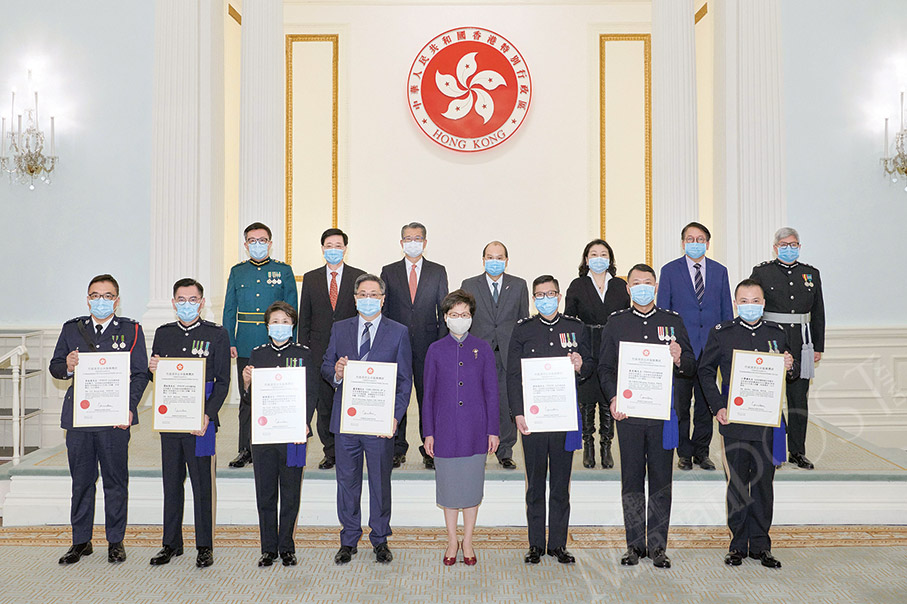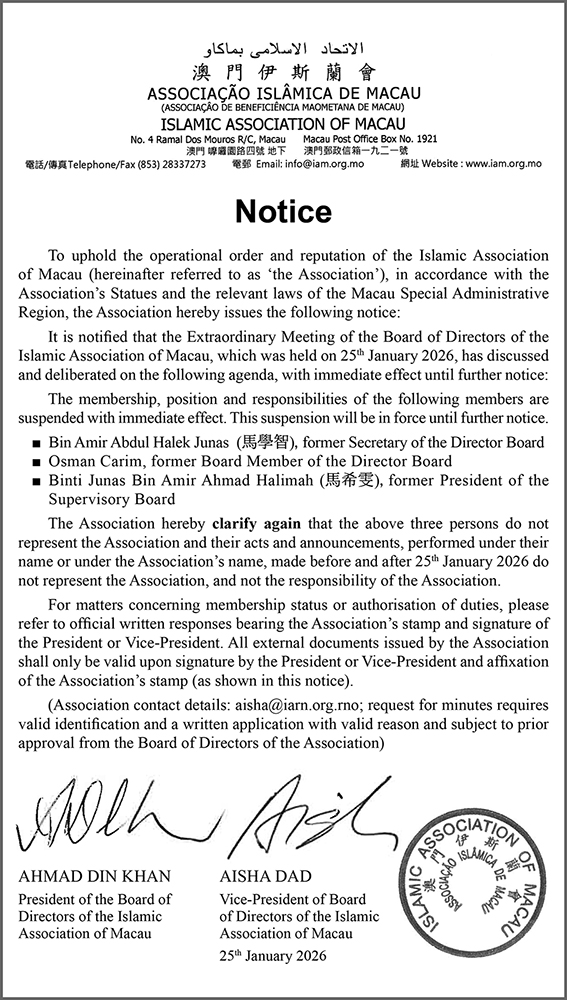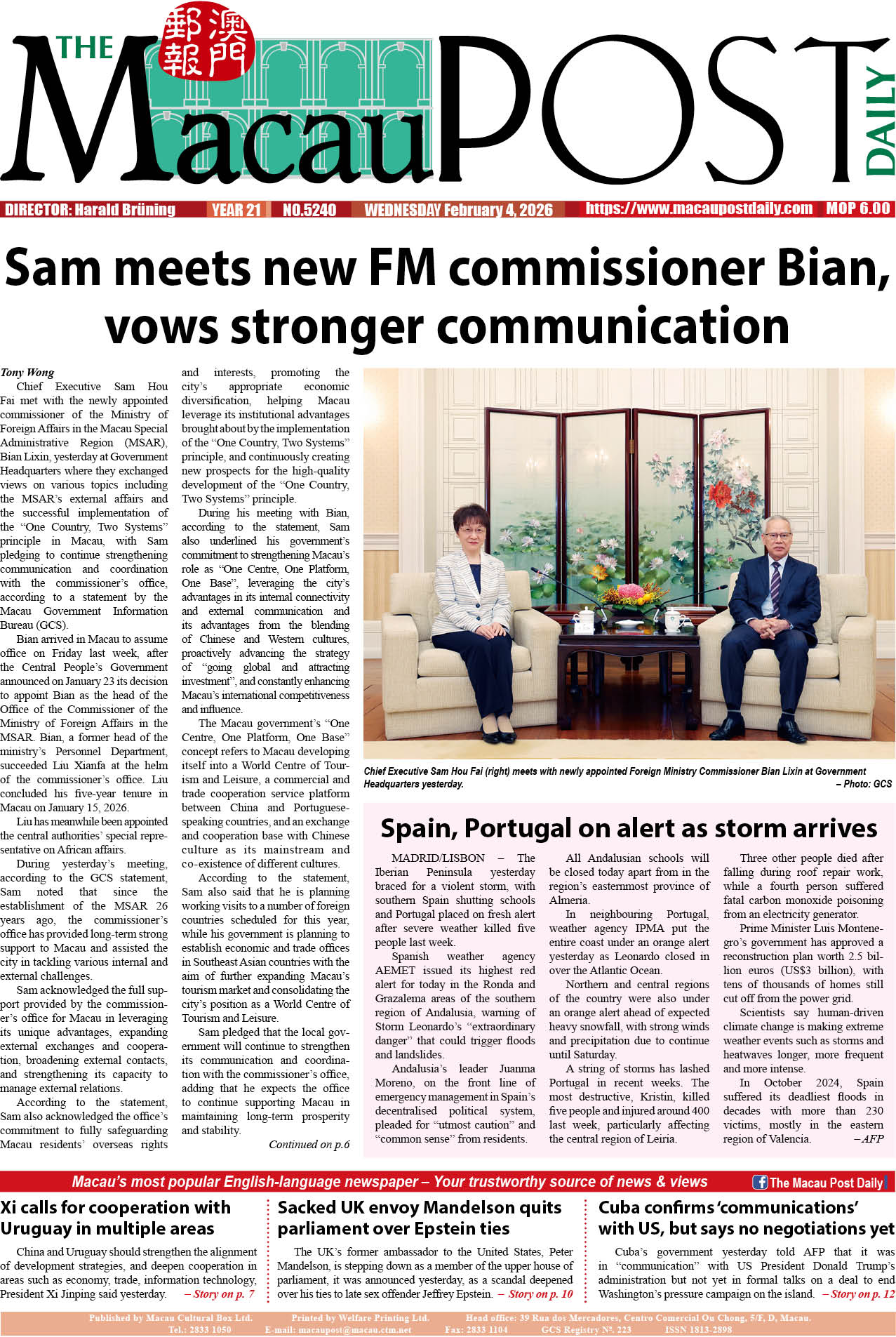Commentary by Alan Smith*
Whilst in Europe last year a number of friends, having followed the news of Hong Kong in the international press, asked me if I felt safe in Hong Kong in the light of the much-publicised “Chinese clampdown”, and whether I was now thinking of quitting our home of the past 50 years. Some said that they only felt able to ask this since I was not then physically in HK, because they assumed from what they had seen in the international media that “the Chinese“ might be listening to telephone conversations there.
In recent weeks the language has become even more extreme with some of the leading British newspapers using the word “tyranny” to describe the situation in Hong Kong
These are bizarre questions to ask and statements to make of a place which, despite the problems it has faced recently, still remains one of the best places in Asia in which to live both in terms of personal safety and its response to COVID-19, and where people continue safely to go about their normal lives.
So why these concerns ? Because the now internationally accepted Hong Kong Narrative paints a dystopian picture of HK, quite unbalanced and at odds with reality. This HK Narrative originally promoted by Trump and Pompeo, partly for electoral reasons, reflects the geopolitical and ideological struggle the US is waging against China. Sadly, this Narrative has now been adopted by much of the Western media without further analysis, and it is clear that HK has become disposable collateral damage in a bigger geopolitical struggle.
According to the HK Narrative widely accepted as the line to take in the West, (1) brave young “pro-democracy” demonstrators faced (2) brutal attacks from HK police (3) acting at the behest of China.
The HK Narrative further claims that the response from the People’s Republic of China (PRC) to the violent demonstrations seen in HK has been the unjustified imposition of a Draconian crackdown in the form of a new National Security Law (NSL) which, according to the Narrative, has removed HK’s basic freedoms and will once again lead to the often predicted “end of HK“.
Let’s examine these claims.

Hong Kong Special Administrative Region (HKSAR) Chief Executive Carrie Lam Cheng Yuet-ngor (fourth from right) poses with seven serving and retired senior police officers during a commendation ceremony at Government House last week. Lam presented the Chief Executive’s Commendation for Government/Public Service to the seven awardees for their significant contributions to safeguarding national security. – Xinhua
1 “Pro-democracy” demonstrators
It hardly needs stating that during the 150+ years of HK as a British colony, it was never a democracy. British governors were appointed without any local consultation, and HK residents never knew who the next governor would be until they read it in the South China Morning Post (SCMP).
It is important to understand this because one of the slogans favoured by Joshua Wong Chi-fung and picked up by the international media was “Give us back our Democracy“. This was intended to lead people overseas, who might not follow HK affairs in any depth, to believe that China had somehow removed democratic institutions which HK people had enjoyed in British times.
The fact is that the first time HK people were given any say in the appointment of their Chief Executive (CE) was pursuant to Article 45 of the HK Basic Law put in place by the PRC, not by the British.
That Basic Law goes on to say that “the ultimate aim is the selection of the CE by universal suffrage upon nomination by a broadly representative nominating committee in accordance with democratic procedures“.
In 2014, the PRC sought to introduce universal suffrage to HK exactly as envisaged in Article 45 and, if its proposals had been accepted by Hong Kong’s Legislative Council (LegCo), the CE election in 2017 would have been on the basis of universal franchise – one person, one vote.
However, instead of being welcomed as a move along the road to democracy, it was roundly rejected as “Fake Democracy” by Joshua Wong, Jimmy Lai Chee-ying and other self-styled “pan-dems” on the basis that a broadly representative nominating committee might not have chosen the candidates they wanted.
It might be argued that the Article 45 proposal is not a “perfect” system, but there was no agreement on what a perfect system would look like, and it is never right in politics to let the best be the enemy of the good. As David Blight, Yale professor of American History, rightly observes in the Jan/Feb edition of the US publication, Foreign Affairs, the US “Senate and Electoral College are undemocratic by any contemporary measure”.
Sadly the rejectionists shouted loudest, won the day, and the opportunity for HK to enjoy universal franchise in 2017 was lost. Because I support democracy and wanted to seize the offer we were given to move progressively along that road, I despair at the Alice in Wonderland world where those who opposed the offer of universal franchise call themselves, and are so termed by the international media, the “pro-democracy camp”.
It may well be that people overseas are unaware of the malign and damaging role that many of the leaders of the self-styled “pan dems” played in preventing HK from enjoying universal franchise. These leaders are understandably keen for this to be forgotten, and many of the 12-15 year old demonstrators are likely too young ever to have been aware of these little talked-about truths. This, however, is not a good reason for others to be complicit in failing to remember how we arrived at the situation we find ourselves in.
Nor was it a surprise that in the demonstrations in 2019 the self-described “pro-democracy activists” displayed none of the characteristics you might normally expect from supporters of democracy – tolerance, respect for individuals, a willingness to listen to the views of others and to compromise in order find an acceptable and reasonable way forward.
There are countless examples where ordinary HK citizens who remonstrated with the activists were physically threatened and violently attacked often with iron rods and bricks by groups of masked, black-clad rioters described by the international media as “pro-democracy demonstrators”. In one horrifying video a member of the public was doused in flammable liquid and set on fire by the black shirts, suffering terrible injuries. In another case a 70-year-old man helping to clear a road blocked by rioters near a university campus was killed when hit by masonry thrown by a black-clad demonstrator.
To date, none of the well-known pro-democracy leaders have condemned these violent attacks or the trashing of the Legislative Chambers, nor have they called for those guilty of setting fire to people, banks or the railway system to be brought to justice. This, in sharp contrast to the reaction of even the Republican leaders in the US following the Capitol Hill outrage, who are keen to see their demonstrators jailed for long periods.
In one case a gang of 30 black-clad individuals assaulted a 29-year-old visitor to HK, innocently walking back to his hotel, because he looked like a mainlander. In another case, a gang of protesters attacked a 45-year-old drunken local who, because he attempted to clear some of the obstructions at a major road junction, they thought was a policeman.
Recently the self-styled “pan-dems” have opposed extending the franchise to HK permanent residents temporarily living and working elsewhere in China. They see no irony in claiming to be “pro-democracy” but not wishing to extend the vote to people they fear will not support them. No wonder they were big Trump supporters and Jimmy Lai’s money was used to produce an anti-Biden video in support of Trump in the recent US election.
If the press wishes to label them at all, it would be much more honest to call them “anti-China activists”. The one thing that seems to unite them is not a love of democracy but a hatred of China. This was all too evident in their fire-bombing of PRC banks and enterprises, in their physical attacks on innocent mainland tourists and businessmen, in their desecration of the Chinese flag and the virulent anti-China slogans they spray-painted around major sites in HK.
2. ‘Police brutality’
These days there is no need to write much about this part of the HK Narrative. Anyone can Google up multiple videos from the time, and it is easy to form a view of who was creating the violence and who was behaving with brutality
Hong Kong has been fortunate that, over the past 50 years, riot police have rarely been called into action, and therefore people in HK have had little experience of the modus operandi of riot police around the world. Observing how the American police handled the Black Lives Matter demonstrations puts the HK police actions into sharp contrast, and the recent attack on Capitol Hill led to 5 fatalities in one day. It is clear that riot police in Spain, France or the US would never have endured the petrol bombing of police stations, police vehicles and the policemen themselves without a serious and bloody response. This did not, of course, stop Senator Ted Cruz on a visit to HK saying that he had seen no violence by the demonstrators, only violence from the police. Clearly there’s a reason why President Trump refers to the senator as “lying Ted Cruz”.
A young Canadian vlogger, Toby Guu, came to HK in September 2019, planning a video “to share the brutality, the pain and the difficulties…residents here in Hong Kong are experiencing every single day when they go and try to fight for the freedom”. What he saw and showed on his vlog surprised him. “I think the police are restraining themselves a little bit. This is just purely from what I’ve seen, there wasn’t as much police violence as I expected there to be. There was actually more violence from protesters....This is just purely from what I’ve seen... These guys say they are trying to fight for democracy, but they’re trying to suppress everyone that speaks out against them. That is the opposite of democracy. That is the opposite of freedom of speech. That’s the opposite of a free society,” was his view.
For posting his video and comments on YouTube, he received abusive emails and death threats.
3. ‘Acting on orders from China’
One of the basic principles of the HK Narrative is that all bad things have their origins in China: thus it was initially stated as a fact that the Extradition Law proposal was a requirement of Xi Jinping. Only much later was it accepted that this was an initiative from Carrie Lam Cheng Yuet-ngor and not the Chinese leadership.
The demonstrators were shameless in fabricating total falsehoods about the effect and intention of the Extradition Bill. It was claimed that the bill would have enabled mainland police to seize demonstrators from the HK streets and take them off to courts in the mainland. This despite the fact that political crimes were specifically excluded from the bill
In the same way, when tear gas was first used in HK during the disturbances the Chinese leadership was again blamed for ordering it. The fact is that whether or not to use tear gas was an operational decision left to relevant police officers on the spot. As it happened the officer who made that decision was an English policeman who had joined the RHKP in colonial times and stayed on post-1997. Unfortunately for him, his name is now well known and he, his wife and young daughter have been doxxed and receive abusive telephone calls and emails. Interestingly, France has just made this sort of activity against police a serious crime.
The new National Security Law (NSL)
The sad fact which we all know, but which goes uncommented upon in the HK Narrative is that if the self-styled “pro-democracy activists” had not so clearly targeted mainland citizens and national institutions with their attacks, fire bombs and desecration, and had not sought to deliberately provoke the PRC leadership, there can be little doubt that the PRC would have been content to leave the HK security legislation unchanged. This was acknowledged by Jimmy Lai himself in a recent Financial Times (FT) article.
The only two things that Deng Xiaoping said were off limits post-1997 were promoting Independence for HK, or using HK as a base to try to undermine the Central People’s Government. Was that too much to ask? For the anti-China activists it seems it was, and we must now all face the consequences.
The new National Security Law is always described in the HK Narrative as “sweeping” and “draconian”, but it is clear that critics who use these terms have never actually read the British Official Secrets Act legislation, the American PATRIOT Act or Australia’s much more restrictive Espionage and Foreign Interference Act.
The NSL is reasonably brief and is not (in contrast to the US legislation) retrospective. It spells out specific acts which are prohibited such as arson in public buildings and blocking transport systems. Sedition remains an offence as it was in British times.
Apple Daily, the SCMP and other newspapers are still actively critical of the HK government and China, and RTHK (the government-funded radio network) provides a welcoming platform for the usual talking heads of the “pro-democracy” camp. By contrast both the UK and Taiwan have recently revoked the licence of a major pro-China broadcaster, and Singapore media would never dream of criticising the Singapore government on this scale.
Let’s sum up:
If your view of HK is one where idealistic youths are being oppressed by an autocratic HK government, you are seeing the story through the distorted lenses of the Hong Kong Narrative.
What HK deserves from the international media is a much more balanced and nuanced approach to the issues it faces, and journalists who are interested in getting to the real truths rather than making simplistic headline-grabbing claims.
* Former law lecturer, HKU; former chairman of Jardine Fleming Group Ltd; and former vice-chairman Credit Suisse First Boston. A shortened version of this article appeared in Fortune.com on February 10.








